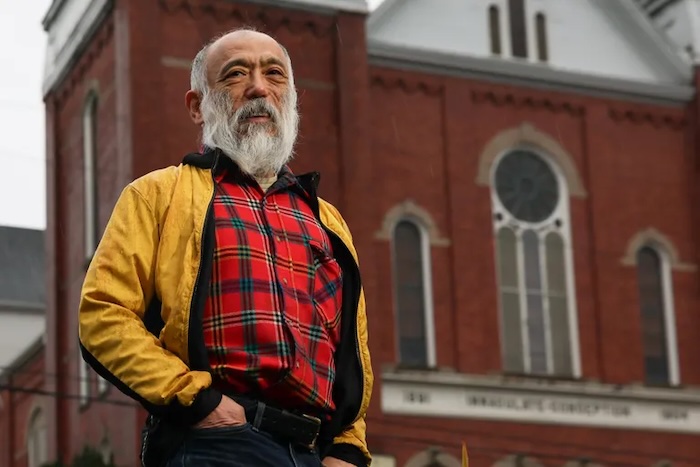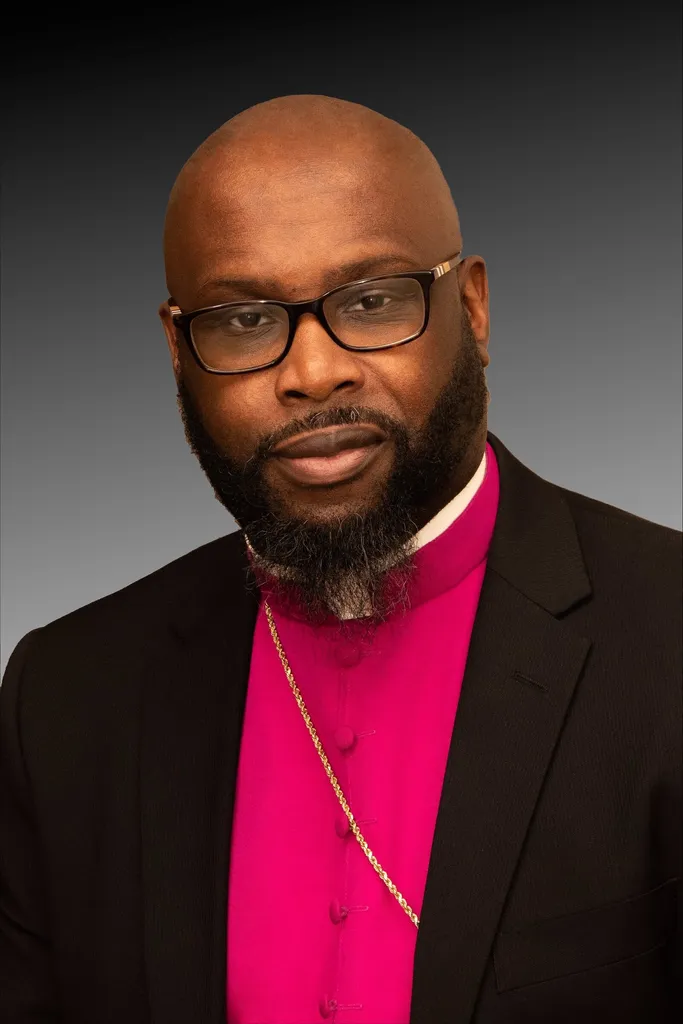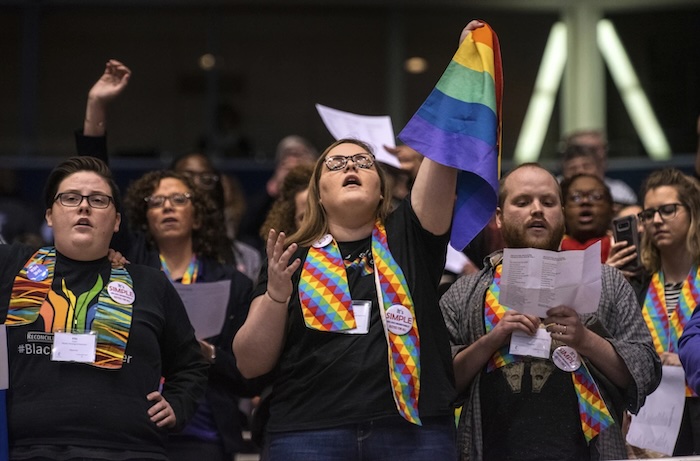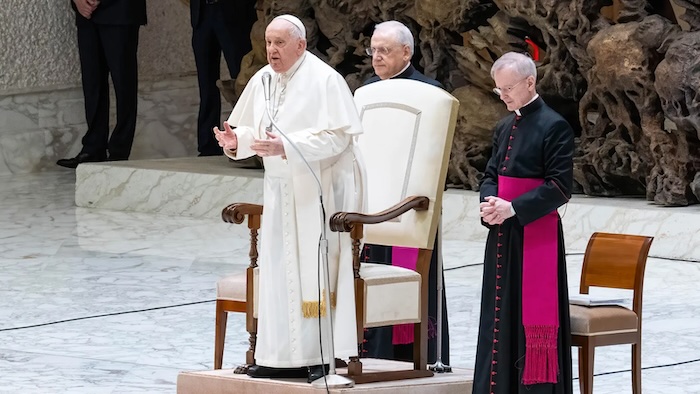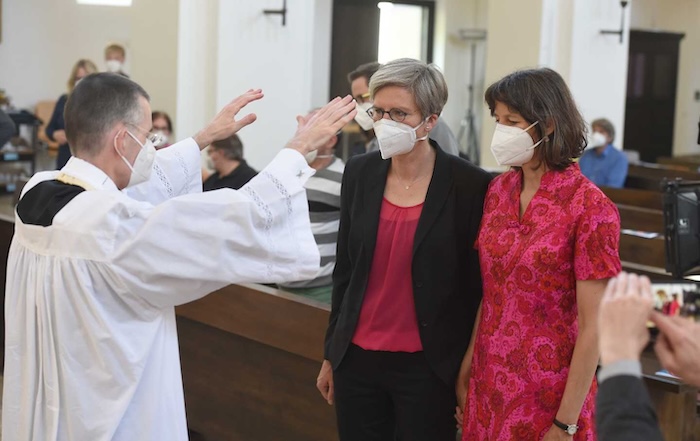— Has the pope’s statement on same-sex marriage created more problems than it solves?
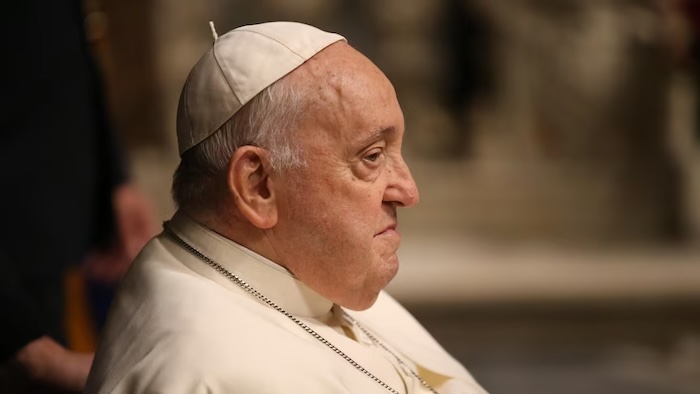
By Miles Pattenden
Pope Francis has endorsed same-sex couples; or he hasn’t; or he allows them to be blessed but only as separate individuals. The news out of the Dicastery for the Doctrine of Faith (DDF) following the publication of Fiducia Supplicans (a declaration “on the pastoral meaning of blessings”) has been various and confusing.
Cardinal Víctor Manuel Fernández, the DDF’s beleaguered Prefect, last week had to issue a press release “clarifying” the declaration’s reception and interpretation.
Fernández, like Pope Francis, claims to be clear about two things:
- The blessings discussed in Fiducia Supplicans are not a substitute for marriage — nor should they be confused as offering anything sacramental or equivalent to marriage.
- The Catholic Church’s teaching on homosexuality remains unchanged — that is to say, the Church regards homosexual feelings as regrettable but not sinful. Consummating an act of same-sex love is, however, wrong because all non-potentially procreative sex and all sex outside of marriage is contrary to God’s will for humanity.
This latter position is consistent with the various stances that individual popes, cardinals, and theologians have taken over the course of the twentieth century and during the first two decades of the twenty-first.
Of course, it does not satisfy gay Catholics who argue that the perception that God is against same-sex love is a product of historical bigotry rather than divine revelation. They, moreover, point to the fact that most heterosexual Catholics also routinely ignore the Church’s teachings on sex outside marriage — and this does not stop priests and bishops agreeing to marry them.
Conservative Catholics, on the other hand, sometimes seem to worry that even framing the situation in such terms (hate the sin, love the sinner) is just a cover for those who would prepare the ground to change Church teaching.
Juxtaposing God’s unlimited love and mercy with a somewhat petty, arbitrary prohibition on a particular loving act can be argued to be highlighting an inconsistency in the Church’s position — even if there are sound theological reasons to defend it.
What “Fiducia Supplicans” tried to do
Fiducia Supplicans should probably be seen as a culmination of Pope Francis’s personal engagement with the issue of same-sex love which began with his now celebrated (or notorious) 2013 remark in response to a question about gay Catholics: “Who am I to judge?”
Gay Catholics, and liberal Catholics, have pinned their hopes on him to usher in reform ever since — on this issue and on other issues relating to women in the Church, clerical marriage, divorced Catholics, and sex outside marriage. Conservatives and traditionalists, by contrast, have grown increasingly suspicious.
Last year, Francis responded to five “dubia” (or questions) which a group of conservative cardinals sent to him. From the outside, their effort appeared to be intended to box him in on these subjects — and on the gay question, in particular. In fact, they opened something of a Pandora’s Box, because they gave him the chance to avoid an outright condemnation of being in a gay relationship.
The pope reasoned, magnanimously, that:
In our relationships with people, we must not lose the pastoral charity, which should permeate all our decisions and attitudes. The defence of objective truth is not the only expression of this charity; it also includes kindness, patience, understanding, tenderness, and encouragement. Therefore, we cannot be judges who only deny, reject, and exclude.
He invoked a concept of “pastoral prudence”, which dictates that a priest:
must adequately discern whether there are forms of blessing, requested by one or more persons, that do not convey a mistaken concept of marriage. For when a blessing is requested, it is expressing a plea to God for help, a supplication to live better, a trust in a Father who can help us live better.
In a way, Fiducia Supplicans just repeats this message, clarifying a somewhat ambiguous further statement that Francis made: “Decisions that may be part of pastoral prudence in certain circumstances should not necessarily become a norm.”
The main points the text makes are simply that blessings are ubiquitous in Christianity, they have different meanings, and they need not take on specific ritual or liturgical forms. They can be “spontaneous” and, when spontaneous, they need not be taken to mean something specific. In this way, it is possible to “bless” gay couples (or anyone else) without condoning their lifestyle or actions.
One can sympathise with Cardinal Fernández in thinking that the pope’s 2023 answer to the dubium raised more questions than it answered and might have merited a timely interpretative statement to settle debate about it. But Fiducia Supplicans has patently not settled debate — in large part because neither side is willing to accept it at face value. Both supporters of reform to the Church’s teaching on homosexuality and opponents believe it sets down a marker that will be used in new ways.
Critiquing “Fiducia Supplicans”
For liberal Catholics, Fiducia Supplicans can seem, in some ways, a mere acknowledgement of the obvious: that God is moved by love and mercy and that the point of blessings is to recognise and give thanks for that.
For Cardinal Fernández, the document’s point is probably something different. It attempts to diffuse the issue by defining a series of propositions on which the pope has allowed significant speculation to build.
For instance, if a “blessing” is simply a spontaneous gesture of thanks to God — what is referred to in Fiducia Supplicans as an “ascending” blessing — then it is hardly something that any reasonable person could confuse with the sacramental rite of marriage.
On the other hand, if the blessing is what the document terms a “descending” blessing — a request to God to extend his grace — then it is little more than a prayer. It is an act that asks God to grant something which he may or may not do — but what it asks God remains ambiguous.
Too Jesuitical by half?
The conservative fear about Cardinal Fernández’s interpretation of the blessing of gay couples is this: a gay couple can understand it as a blessing on their union and their friendship, but a conservative priest can, with equal legitimacy, understand it as exhorting God to help the couple, through his grace, to see the error of their ways.
Fernández may think this takes the theological heat out of the matter — by allowing different parties to believe it has different effects — but it does not.
At the moment, no conservative priest will consent to bless a gay couple, which makes the proposition just advanced seem ridiculous. Yet one can imagine why a conservative priest might be anxious that the pope is preparing the ground to require him to do so by creating a Jesuitical loophole for his conscience which can later be closed. The Church of England appears to be going through much the same process of self-inflicted contortions with regards to its own “gay marriage” debate.
These arguments, moreover, form part of wider critiques against Francis and his approach to the pontificate. Conservatives now also criticise Fernández for showing a deplorable lack of judgement.
The apparent naïveté in promulgating Fiducia Supplicans and then clarifying it damages the papacy, as an influx of requests for papal blessings on parchment sheets (a special kind of document all Catholics can request from the Vatican) for same-sex couples now shows. Francis has thus been put in a bind, which he may not have intended. As Christopher Altieri notes:
he can’t refuse [these requests] without appearing stingy and legalistic — “rigid” is a word for it — but he can’t grant them without violating both the letter and the spirit of the very declaration that created the conundrum in the first place.
Yet Fiducia Supplicans surely also represents yet another papal grab for authority over Church teaching. In defining so closely what is a blessing — spontaneous or otherwise — it implicitly removes discretion from bishops about how to judge the actions of their own priests. This is no more popular than when Francis curbed their licence to authorise the Tridentine Latin Mass.
Such arguments have force, moreover, because gay blessings are just one front in the battle. Recent reports that Francis is being urged to allow priests to marry or even to let lay people have a say in the process for electing his successor are alarming conservatives just as much. And with the battle on so many fronts, it is not clear how best to oppose the pope. It is not even clear which of these causes, if any, he is most serious about advancing in the perhaps short time he has left.
2024 could be a turbulent year for the Catholic communion. No doubt all Catholics are praying for wisdom from all sides as they try to resolve amicably the forces unleashed.
Complete Article ↪HERE↩!

